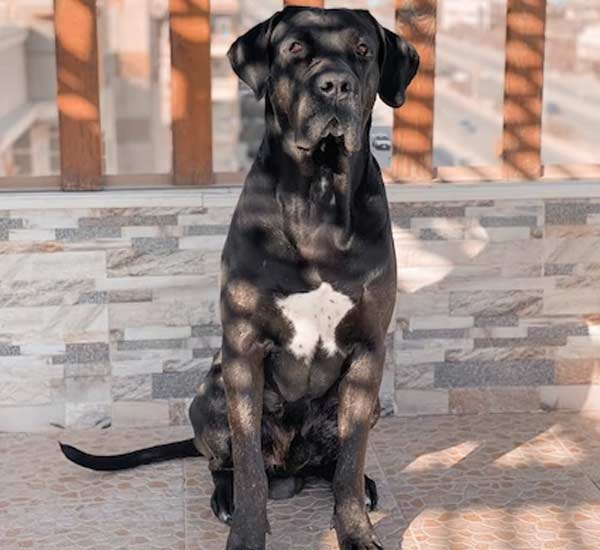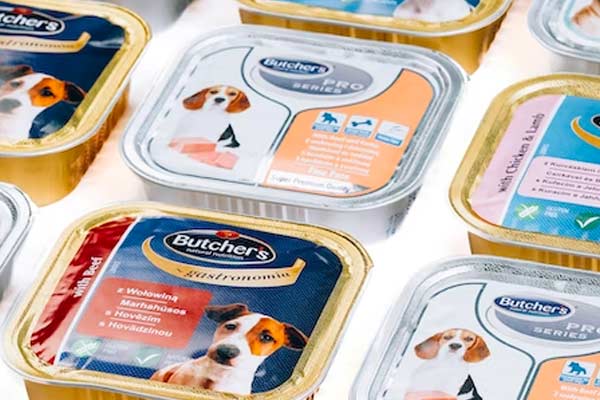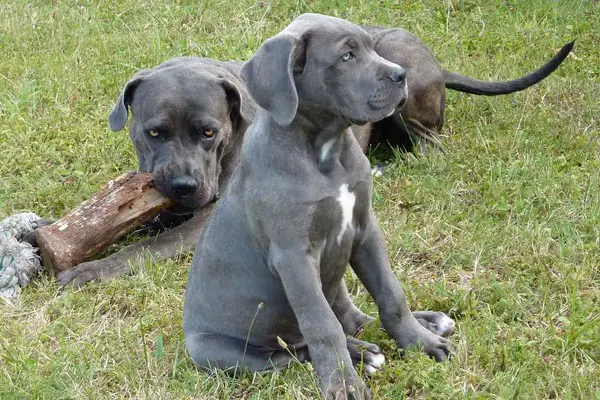One of the burning questions you will have when considering dog ownership is cost. With certain breeds, like the Cane Corso, you know you will spend a lot of money at the outset.
But how much will the annual costs be for such a large dog? Your Cane Corso might be over 100 pounds.
How Much Does a Cane Corso Cost?
A Cane Corso price for a puppy is usually $1,500 to $4,000, with an annual expense budget of $4,500 for an adult. A puppy costs more during her first year because she eats more, and you will have to purchase her start-up supplies.
Also, she needs training, socialization, her first sets of health checks, spaying or neutering if you decide, ear trimming, and vaccinations.
You may wonder why a Cane Corso is so expensive. At 25 to 28 inches tall and 80 to 110 pounds, size probably has a little to do with the purchase price and a lot to do with ongoing expenses.
More relevant to your upfront costs are the historical rarity of the breed, the dog’s age or designed purpose, and the investment required to raise a healthy litter of Cane Corsos from the mother’s pregnancy to when the puppies go home around seven to 16 weeks.
What Factors Affect Cane Corso’s Price?
- Pedigree – One of the primary drives for high Cane Corsos price tags are champion show or working lines
- Training – A fully trained guard dog will command among the highest prices for a Cane Corso
- Age – Puppies 8 to 12 weeks, except for a finished show dog or trained working dog, will be the most expensive
- Breeder – A registered breeder who participates in programs to better the breed and has higher standards to uphold will charge more
- Color – Unlike some other breeds, colors do not make a tremendous difference to Cane Corso prices, except nonstandard colors are often cheaper; Nonstandard colors are black with tan points or straw; Sometimes grey dogs and dilute fawns(formentino) are more expensive since they are rarer and more difficult to produce than black, fawn, red, or brindle
This is a showy male formentino Cane Corso with trimmed ears. If he comes from a show background, he can command a premium price, assuming he is for sale. If not, being an older puppy, he might be a bargain from a breeder. Note males and females are similar prices.
Black is still one of the most sought-after colors for Cane Corsos, although it is the most common. These pups will be expensive because of their ages, and they have minimal white markings. They will be even more if they are from show or protection lines.

How Much Does It Cost to Adopt a Cane Corso?
Adopting a Cane Corso is almost always cheaper than buying a dog from a breeder. A shelter or rescue is often concerned with finding dogs a permanent home and recovering their costs rather than making a profit.
Many shelters and rescue organizations run solely on donations. Even humane societies that receive some state funding do not make money from the dogs they adopt.
According to Adopt-a-Pet and other similar organizations, adoption typically runs from $200 to $500 for a Cane Corso. These costs may include expenses to vaccinate and neuter your prospective dog but mainly cover caring for incoming Cane Corsos.
Sometimes the money you spend on adoption is well worth the price because your prospective dog may undergo a behavioral assessment, basic training, and foster care before you even see her in person.
How Much Is the Cane Corso Price for Purchase?
If you stumble across a desperate seller, you may find a Cane Corso in the newspaper selling for $300 or $400. Such a price is extremely rare and should raise your suspicions about the care and pedigree of the puppies.
More often, such a price tag under $350 fits an owner who needs to rehome his or her adult Cane Corso immediately. Even then, a price of under $500 is uncommon.
Most of the time, you can expect to pay an average of $900 to $2,000 for a purebred pup from a reputable breeder, according to Yourdogadvisor.com.
Prices between $1,500 and $4,000 are common for high-quality Cane Corso puppies. The sky is the limit if you are looking for a show dog or working Cane Corso. These dogs easily command prices between $2,500 and $10,000 or more.
This is one of the most expensive Cane Corsos you can buy. This dog exercises discretion, manners, and impeccable obedience as a male fawn. He is trained to attack commands and stop when directed. He is more of a personal protection dog than a guard dog.

Why Are Cane Corsos So Expensive?
Many dog lovers believe their peers get into dog breeding to make money. Most of the time, this is not the case. If it is, breeders quickly discover how costly it is to produce and raise a healthy litter of pups.
Instead, dog breeders are usually passionate about the breed they promote and seek to improve it and people’s knowledge about it. Cane Corsos are not as expensive to breed as French or English Bulldogs, but they are quite an investment.
Stud Fee
A Cane Corso can command an average stud fee of $1,000 to $2,000. However, the range is from $500 to $3,000, and some stud owners require the pick of the litter. If you have a premium litter, the stud fee potentially costs you $4,000 or $5,000.
The other side of the coin is if you, as a breeder, own the stud you want to use for a litter. Then you are out the costs of maintaining that dog for a year.
According to Petbudget.com, it costs $700 to $25000 to maintain one of these Italian Mastiffs for twelve months. Plan on spending about $1,400 to $1,600 for a healthy male because of the amount of food he will require.
Having a mother is a challenge
The dam or mother of a litter of puppies will be a little more expensive than a stud dog for at least a few months of the year, with a total annual cost of $1,900 to $2,400.
The mother eats about twice as much food as a normal dog while pregnant and uses up to three times as many calories when nursing.
Breeders understand their dogs will carry the pups for about 65 days, give or take, and nurse them for another six to nine weeks. They require the most energy after the first 40 days of pregnancy through the initial three weeks of nursing.
Like many large breeds, there are rare reports of litters as large as 12 to 19 puppies, but most Cane Corsos whelp six to ten puppies in a litter.
Extremely large litters are time-intensive, often requiring splitting of the pups for nursing, supplemental feeding, and early weaning.
Costs associated with the Cane Corso dam do not consider veterinary visits and diagnostic tests. The most efficient use of the stud involves ensuring the female is receptive and fertile.
Veterinarians often conduct vaginal smears on high-quality animals so the breeder can make an appointment for mating at the optimal time. Your vet may need to perform several smears over a week.
He or she is looking for specific changes to the vaginal cells that are most accurate for determining when the female is ready to mate. Cytology involves using special dyes to highlight the cells and may cost $20 or more each.
Assays that measure reproductive hormones like LH (luteinizing hormone) are even more expensive as they require analysis by a laboratory.
Suppose you own the stud or have unlimited access. In that case, you might be able to forego laboratory costs and gauge behavioral changes in the bitch to determine when to put the two dogs together.
Once the breeder suspects a successful pregnancy, diagnostics involve additional costs.
- Ultrasound – Can confirm pregnancy at 30 days, sometimes earlier; Also checks the viability of puppies; $90 to $350 per scan – Keep in mind that pregnancy U/S scans are much less involved and thus cheaper than other diagnostic ultrasounds
- Abdominal palpation – Your veterinarian feels your dog’s belly for fetuses in the uterus; Performed at 28 to 30 days and requires a high skill set; Not a sensitive test because pups may not be detected in nervous, tense mothers, or if there are not many fetuses; Cost of a brief to a full exam, $20 to $65
- The canine pregnancy test that measures relaxin hormone – Detects pregnancy earlier than any other means about 21 to 28 days; Over-the-counter $20 to $30
- Radiographs – Most accurate way to count pups (Still not 100%) and compares puppy size to the width of the mother’s pelvis to predict the necessity for a C-section; Can start at about 42 days; $100 to $300
Most Cane Corsos will not require a Caesarian. The breed also does not suffer from calcium abnormalities like many Toy dogs. You must not supplement calcium during pregnancy unless on your veterinarian’s advice.
Ethical breeders raise puppies responsibly through weaning
Many Cane Corso dams have had enough of their offspring’s sharp teeth when the puppies are six or seven weeks old.
The breeder usually introduces solid food as a wet mash, gruel, or supplements with a canned diet by the time the pups are four weeks old.
Moreover, a responsible breeder will deworm the pups once or twice and give them at least one set of vaccinations before they head to their new homes. Breeders also may need to dock tails, which they have a veterinarian perform when the pups are less than three days old.
Depending on the size and demands of the litter, pups can cost $250 to $450 to raise to the age of seven weeks.
Costs involve wellness checks, vaccinations, and tail docking at less than three days old. This does not take into account puppies that require supplemental or replacement milk.
If puppies require complete replacement feeding, a litter could cost $12 to $50 daily to feed for three or four weeks.
For example, a veterinarian reports a three-week-old puppy requires about 20ml of commercial formula per gram of body weight. Such a pup is only 0.1 kg or 3.5 ounces, so you can imagine how the amounts for a large Cane Corso puppy can add up quickly.
Formulating a homemade milk replacer from cow’s milk and eggs is an attractive and economical option.

Cane Corso Costs Do Not End with the Purchase Price
The cost of owning a Cane Corso is substantial, even if you have a healthy dog. The following analysis utilizes average prices.
- Purchase – $1,500
- Training – $850
- Toys – $15 to $40 monthly
- Ear trim or crop (elective cosmetic procedure) – $150 to $600 plus, average $300; maintenance $20 to $30 per posting of the ears (taping to help them stand)
- Food – $425 until a year old; $400 annually for adults
- Leashes and collars – $20 to $250; Will replace several times during growth
- Spay or neuter (optional but recommended) – $300 to $500
- Staple stomach (to prevent stomach twisting in bloat, optional but recommended) – $300
- First-year preventative – $600
- Adult medical (vaccines and wellness exams) – $750
- Bowls – $20 to $75
- Grooming supplies – Brushes –> $25, shampoo –> $20 to $50 annually, nail trimmers – $12 to $30
- Bedding – $30 to $250 every 1 to 2 years
- Kennel or crate – $25 to $300; May have to replace a few times
- ID Tags – $15 to $25
- Microchip – $25 to $50
Miscellaneous costs include some elective benefits and convenience services.
- Boarding – $25 to $100 per day; you May be able to get packages for a cheaper daily rate.
- Walking – $15 to $25 per session
- Pet insurance – $75 to $200 per month
- Pet sitting – $25 to $120 per night
